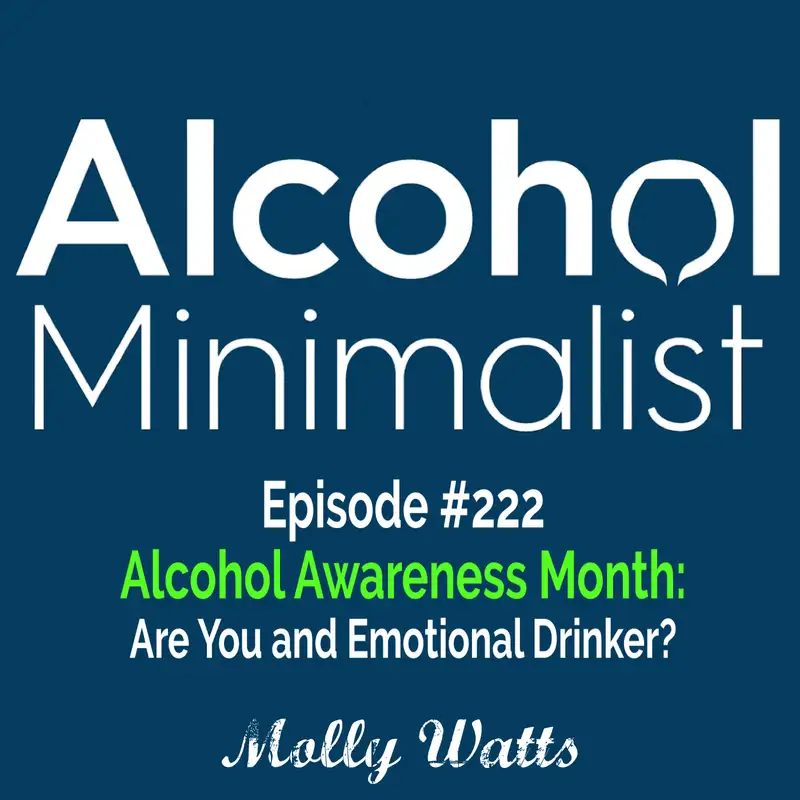Alcohol Awareness Month: Are You and Emotional Drinker?
In this episode kicking off Alcohol Awareness Month, Molly Watts dives into the subtleties of emotional drinking, helping listeners uncover unconscious patterns and build emotional resilience to disrupt them. Drawing inspiration from an episode by Corinne Crabtree on emotional eating, Molly makes powerful parallels to alcohol habits many listeners may not even recognize as emotionally driven.
What You’ll Learn in This Episode:
- A clear definition of emotional drinking—and why it may not look like you expect.
- How seemingly harmless habits, like a nightly glass of wine, might actually reflect emotional needs.
- Why emotional drinking is more about mental load and reward beliefs than willpower.
- How subtle daily rituals become signals of self-worth and stress relief.
- The truth about shame cycles, secrecy, and the false binary of being either “good” or “bad” with alcohol.
- The connection between alcohol and emotional regulation, and how to begin shifting the cycle.
Key Concepts Discussed:
- Emotional drinking doesn’t require drama—if you’re using alcohol to relax, cope, or mark the end of the day, emotions are involved.
- Emotional resilience is foundational—not just for changing your drinking, but also for improving your relationship with yourself.
- Common beliefs like “I deserve this” or “this is my time” are tied to deeper unmet needs.
- The parallels between secret eating and emotional drinking: both serve as a way to signal “I matter.”
Mentioned in This Episode:
- Sunnyside App – A science-backed tool Molly recommends that focuses on:
- Pre-commitment and intention setting
- Conscious interference through tracking
- Positive reinforcement with coaching support
Try Sunnyside Free for 15 Days
- Losing 100 Pounds with Corinne Podcast
Powerful Quote:
“If you’re pouring a drink to shift emotional gears—whether to relax, reward, or disconnect—you are emotionally drinking. And that’s not a problem, it’s just a place to get curious.”
Let’s Connect:
Website: www.mollywatts.com
Instagram: @alcoholminimalist
Facebook: Join the Alcohol Minimalists Group
Low risk drinking guidelines from the NIAAA:
Healthy men under 65:
No more than 4 drinks in one day and no more than 14 drinks per week.
Healthy women (all ages) and healthy men 65 and older:
No more than 3 drinks in one day and no more than 7 drinks per week.
No more than 3 drinks in one day and no more than 7 drinks per week.
One drink is defined as 12 ounces of beer, 5 ounces of wine, or 1.5 ounces of 80-proof liquor. So remember that a mixed drink or full glass of wine are probably more than one drink.
Abstinence from alcohol
Abstinence from alcohol is the best choice for people who take medication(s) that interact with alcohol, have health conditions that could be exacerbated by alcohol (e.g. liver disease), are pregnant or may become pregnant or have had a problem with alcohol or another substance in the past.
Abstinence from alcohol is the best choice for people who take medication(s) that interact with alcohol, have health conditions that could be exacerbated by alcohol (e.g. liver disease), are pregnant or may become pregnant or have had a problem with alcohol or another substance in the past.
Benefits of “low-risk” drinking
Following these guidelines reduces the risk of health problems such as cancer, liver disease, reduced immunity, ulcers, sleep problems, complications of existing conditions, and more. It also reduces the risk of depression, social problems, and difficulties at school or work.
Following these guidelines reduces the risk of health problems such as cancer, liver disease, reduced immunity, ulcers, sleep problems, complications of existing conditions, and more. It also reduces the risk of depression, social problems, and difficulties at school or work.

